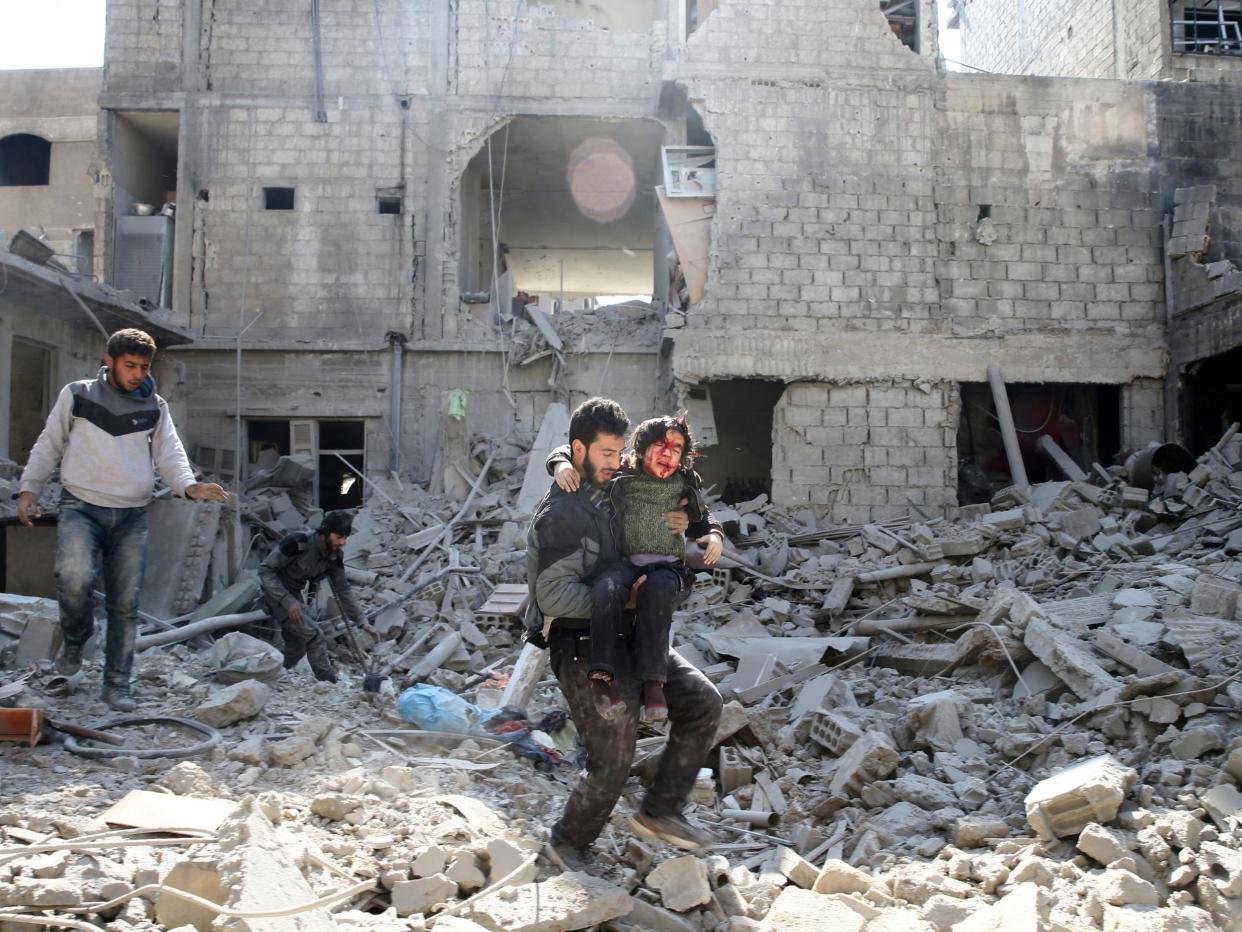‘We are waiting to die’: 27 more civilians dead in eastern Ghouta as ferocious Assad assault continues

At least 27 people have been killed and more than 200 injured in fresh air strikes on a rebel held suburb of Damascus, as the Syrian government continues a ferocious assault that has already killed 299 civilians.
Several districts of Eastern Ghouta were targeted overnight and early Wednesday, the third day of a relentless campaign which the area’s 400,000 residents fear will end in ground forces moving in. Local counts put the number at 40 dead on Wednesday morning.
Another 13 bodies, including five children, were recovered from the rubble of houses destroyed on Tuesday in the villages of Arbin and Saqba, the Syrian Observatory for Human Rights reported.
Monitors also confirmed the use of barrel bombs – illegal under international law because they cause damage over large areas – as well as conventional bombing, shelling and rocket strikes by Syrian and Russian warplanes.
“We are waiting our turn to die. This is the only thing I can say,” Douma resident Bilal Abu Salah, whose wife is five months pregnant with their first child, told Reuters. They fear the trauma will cause her to go into labour early.
Testimony and footage from the besieged area convey a picture of chaos. Families stumble around calling the names of loved ones after air strikes, coughing on the thick dust and smoke. Pictures of injured children showed torn limbs, rib cages caved in and bloody head wounds.
And men wept next to the bodies of their children, wrapped in bloodied white sheets, finally located at nearby hospitals and morgues.
“I have never seen anything like this,” said a local doctor who gave his name as Malik. His facility received 13 patients overnight and four more this morning. Three of those admitted died.
“The hospital is maybe not safe either. But we have to keep going.”
Medical charity the Union of Medical and Relief Organisations (UOSSM), which runs hospitals in opposition-held Syria, said at least seven medical facilities had been targeted by strikes in the last three days and two health workers have been killed, as well as one White Helmets volunteer who was responding to a bombing.
One of the reasons the death toll in recent days has been so high is because doctors cannot treat wounded patients in time, Marianne Gasser, the International Committee of the Red Cross’s head of delegation in Syria, said in a statement.
Ghouta has been besieged by President Bashar al-Assad’s forces since 2012, able to hold out because residents were able to grow some of their own food, and supplies such as medicine and machinery could be smuggled from nearby Damascus. It is the last urban area still under rebel control.
In recent months, however, the government has followed the playbook it has used to crush opposition in other Syrian cities by tightening the siege, leaving civilians struggling with dwindling supplies and turning on each other and the rebel fighters.
Over the last two weeks Mr Assad has stepped up the military campaign, despite the fact Ghouta is one of four supposed de-escalation zones created in a May 2017 agreement brokered by Russia, Turkey and Iran to quell fighting between rebel forces and the regime.
The regime says that the rebel groups in Ghouta are terrorists and therefore not included in the ceasefire agreement.
At least one faction in Eastern Ghouta has links to al-Qaeda, but its presence is believed to be small.
Since Sunday night the area has suffered one of the heaviest bombardments in the entire seven-year-long conflict to date.
Rebels have hit back, firing mortars on nearby districts which wounded four people on Wednesday, Syrian state media said, and killed six on Tuesday.
The United Nations has condemned the bombing of civilian infrastructure, warning that it could constitute war crimes.
The Syrian government and its Russian allies, who first came to Mr Assad’s aid militarily in 2015, have repeatedly denied targeting civilians and using barrel bombs in the war.
Speaking to CNN, Syrian journalist Rami Jarrah criticised the “vague, very irresponsible statements” from the UN “that don’t get us anywhere. They don’t offer anything.
“We Syrians now don’t see a solution to this war.”

 Yahoo News
Yahoo News 
